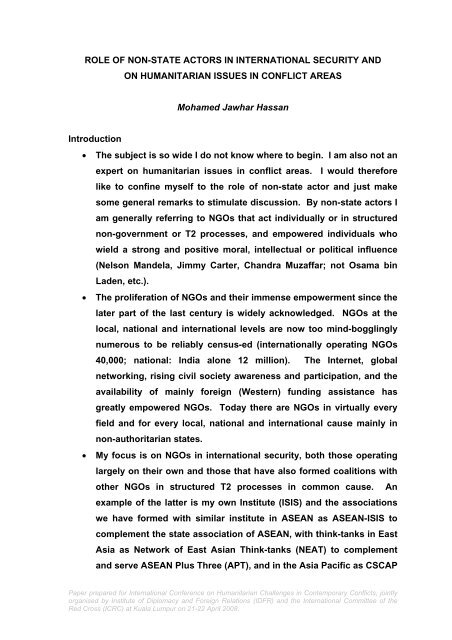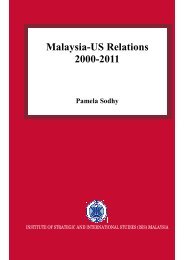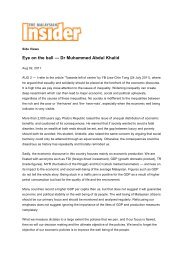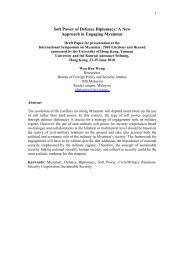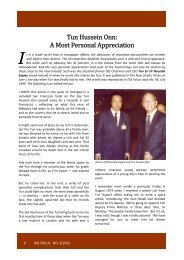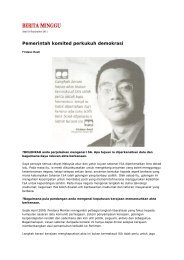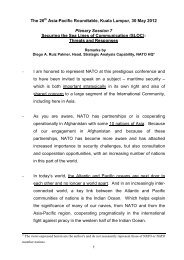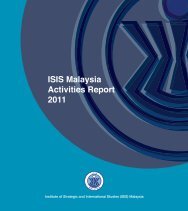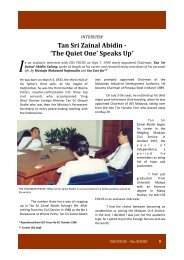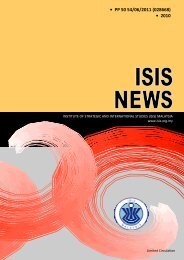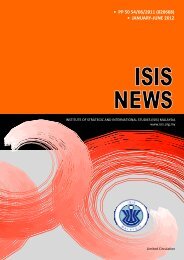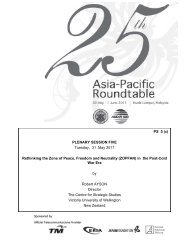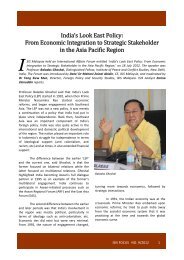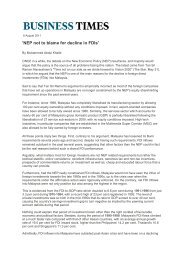ROLE OF NON-STATE ACTORS IN INTERNATIONAL SECURITY ...
ROLE OF NON-STATE ACTORS IN INTERNATIONAL SECURITY ...
ROLE OF NON-STATE ACTORS IN INTERNATIONAL SECURITY ...
Create successful ePaper yourself
Turn your PDF publications into a flip-book with our unique Google optimized e-Paper software.
<strong>ROLE</strong> <strong>OF</strong> <strong>NON</strong>-<strong>STATE</strong> <strong>ACTORS</strong> <strong>IN</strong> <strong>IN</strong>TERNATIONAL <strong>SECURITY</strong> ANDON HUMANITARIAN ISSUES <strong>IN</strong> CONFLICT AREASMohamed Jawhar HassanIntroduction• The subject is so wide I do not know where to begin. I am also not anexpert on humanitarian issues in conflict areas. I would thereforelike to confine myself to the role of non-state actor and just makesome general remarks to stimulate discussion. By non-state actors Iam generally referring to NGOs that act individually or in structurednon-government or T2 processes, and empowered individuals whowield a strong and positive moral, intellectual or political influence(Nelson Mandela, Jimmy Carter, Chandra Muzaffar; not Osama binLaden, etc.).• The proliferation of NGOs and their immense empowerment since thelater part of the last century is widely acknowledged. NGOs at thelocal, national and international levels are now too mind-bogglinglynumerous to be reliably census-ed (internationally operating NGOs40,000; national: India alone 12 million). The Internet, globalnetworking, rising civil society awareness and participation, and theavailability of mainly foreign (Western) funding assistance hasgreatly empowered NGOs. Today there are NGOs in virtually everyfield and for every local, national and international cause mainly innon-authoritarian states.• My focus is on NGOs in international security, both those operatinglargely on their own and those that have also formed coalitions withother NGOs in structured T2 processes in common cause. Anexample of the latter is my own Institute (ISIS) and the associationswe have formed with similar institute in ASEAN as ASEAN-ISIS tocomplement the state association of ASEAN, with think-tanks in EastAsia as Network of East Asian Think-tanks (NEAT) to complementand serve ASEAN Plus Three (APT), and in the Asia Pacific as CSCAPPaper prepared for International Conference on Humanitarian Challenges in Contemporary Conflicts, jointlyorganised by Institute of Diplomacy and Foreign Relations (IDFR) and the International Committee of theRed Cross (ICRC) at Kuala Lumpur on 21-22 April 2008.
at home and abroad; and have better capacity and become morecredible.• Expertise.• Uneven development and empowerment.• Driven by international agenda dominated by West and Westerninterests and values, which in fact are sometimes very relevant andneeded to address problems in the developing world and enhancingtheir progress. However, international NGO work driven by Westerninterests, values and world views sometimes do not jive with themore pressing and relevant needs of developing societies. E.g.emphasis on democracy and civil and political rights over stability,poverty eradication and good governance.3


